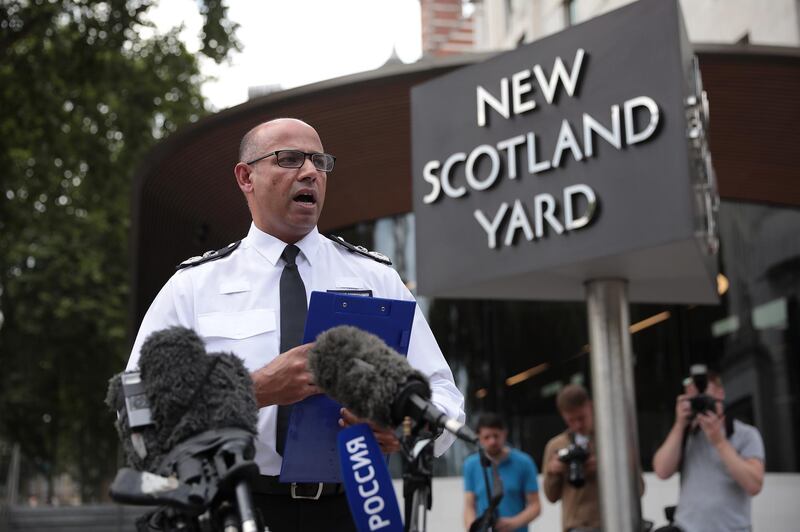The first fatality from a suspected Russian-ordered nerve agent attack on the UK received a high dose of deadly Novichok after handling a container believed to have been discarded by the attempted assassins of a former spy months earlier, it emerged on Monday.
British police said they had launched a murder inquiry after Dawn Sturgess, 44, a mother-of-three, died in hospital on Sunday from the effects of the Russian-made agent, while her partner Charlie Rowley, 45, remained critically ill in hospital.
Police were searching for the contaminated container at the homes of the couple and a park less than half-a-mile from the site where former Russian double agent Sergei Skripal and his daughter Yulia were found stricken in March.
Senior officers said they had not confirmed the agent was from the same batch used to smear the door handle of Mr Skripal’s home in the historic military town of Salisbury, but analysts said it was unlikely to have been from a different batch of the very rare agent.
“Our focus and priority at this time is to identify and locate any container that we believe may be the source of the contamination,” said Neil Basu, Britain’s top counter-terrorism officer. He said it “remains our main line of inquiry” that it was linked to the attack on the Skripals. He warned people to be careful of picking up needles, syringes or containers.
Experts said the attackers could have dropped an item when they retreated to the park to remove gloves and protective equipment and bag up syringes used in the assassination attempt before fleeing the country.
The discovery of any packaging could provide forensic clues that could help identify those responsible for the attack. The town centre is also covered by a modern security camera system that could provide fresh evidence for areas not previously considered.
Mr Skripal and his daughter survived the attack that sparked a global crisis with tit-for-tat diplomatic expulsions and pledges by the UK government to tackle the illicit wealth of Russians that flowed through its financial capital.
Britain also led efforts month to strengthen the powers of the Organisation for the Prohibition of Chemical Weapons (OPCW), the global watchdog, in response to the Russian attack on the UK and the use of banned substances on attacks in Syria. The government held a crisis meeting on Monday following the escalation of the crisis.
Experts said that the death of Mrs Sturgess showed how Novichok could remain in the environment for months without breaking down and how hard it was to track down the substance. The agent was developed by Russia during the Cold War.
“One of the things that Novichok was designed to do was to be a very persistent agent,” said Philip Ingram, a former senior military intelligence officer and chemical warfare expert.
__________________
Read more:
[ British woman exposed to novichok dies in hospital ]
[ UK will not jump to conclusions after second nerve agent poisoning, says minister ]
__________________
Police have been traced the couple’s movements around the time they were infected and believe that they were together at Ms Sturgess’s hostel on June 29 before they walked to the park on a route that would likely have taken them close to where the Skripals were found slumped suffering from the effects of Novichok in March.
They spent time in the Queen Elizabeth Park before heading back to Ms Sturgess’s home and then by bus to Mr Rowley’s home in the nearby town of Mamesbury. Ms Sturgess fell ill at the house and was taken to hospital, before Mr Rowley himself fell ill later in the day.
Police revealed on Monday that Mr Rowley had travelled in a van with three other passengers on Saturday before he fell ill. All three men have been seen by medics and show no signs of being affected. The van was being examined by specialists at the government’s chemical weapons testing centre at nearby Porton Down.
Officials had initially believed that the pair, who both had long-standing addiction problems, were suffering from the effects of taking tainted drugs, before tests revealed that they had also suffered from exposure to Novichok.
The possibility that the would-be assassins dumped or accidentally dropped a container containing Novichok was the first sign of a flaw in what had previously appeared to be a professional operation, said Hamish de Bretton-Gordon, a chemical weapons expert.
“Everything until that moment seems very professional and what we would expect from the [Russian security agency] FSB,” he said. “Why would they discard it?”
If it was done deliberately, then the continued impact of an attack four months earlier would be seen as a successful outcome for Russian attempts to sow problems for one of its most outspoken critics of its foreign policy, he said.







